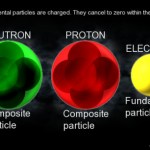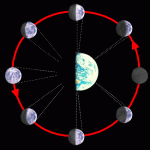Q & A
There's a graduate student that I'm sort-of mentoring/working with at Arizona, named Xiaoying Xu (hi Xiao!). She's bright and curious, and she asks some very good questions. She asked me one yesterday that's pretty tough to wrap your head around:
How do I explain to someone why light doesn't age?
Well, here on Earth, time progresses at a certain speed. That is, if I measure how many seconds tick by as the Earth revolves once around the Sun, I'll get 31,556,926 seconds. (31,558,150 if I'm measuring a sidereal year.)
But let's say in the course of that year, I put you on a rocket ship, and…
I love The Straight Dope. For 35 years, people have written in and asked some of the most difficult-to-answer questions on any topic you can think of; the staffers, writing under the pseudonym Cecil Adams, do their best to get to the bottom of their questions. Well, they also have a message board, and I saw one of the most difficult questions I've ever seen there:
Where does all the matter in the universe come from?
I'm no[t an] astrophysicist but I understand a little about the Big Bang Theory and also that there's lots of stuff we don't know or probably ever will know about it.
But the…
The Moon goes around the Earth, the Earth goes around the Sun, and the Sun goes around the center of the Milky Way. We know the Moon takes about 4 weeks to make its trip around the Earth, and that causes the Moon phases:
We also know that the Earth takes one year to go around the Sun, and that causes the seasons:
We also know that the Earth has been around for about 4.5 billion years, which means it has gone around the Sun about 4.5 billion times. Well, now I ask the question(s):
How long does it take the Sun to go around the Milky Way? How many times has it done that so far, and how many…
startswithabang.com reader Andy has a great follow-up to his question on the Age & Size of the Universe, and asks:
why does the CBR “appear” to come from a light sphere that “appears” NOW to be larger than the universe WAS when it first set off in a straight line on its 13.4 billion year trip???
The "CBR" stands for "Cosmic Background Radiation," and it refers to the (presently) microwave background. Here's why Andy's question is actually profound, and was known for about 20 years as either the homogeneity problem or the horizon problem. The problem is that, when we look up at the sky,…
Let me set the scene for you: I'm fresh off my Ph.D., teaching introductory physics at the University of Wisconsin. I'm trying to demonstrate how to turn potential energy into kinetic energy, and so I ask this simple question:
What is Energy?
And I get a stunned silence back from the room. One of those silences where 25 faces look back at you with eyes that say, "no, you're the one teaching us; you need to answer that one!"
And I confess, this is one of those questions that's looks like the easiest thing in the world, and yet there's no good answer for it. Put simply, energy is possibly…
Alright; this is a question I've been putting off for various poor reasons, but Starts With A Bang! reader Andy asks:
If Im looking at something, the light from which has taken 15 billion years to get to me, and there was only an opaque ball of radiation and stuff 15 billion years ago, why do I see formed galaxies? Shouldnt the age of the universe be: TIME LIGHT FROM OBJECT TAKES TO REACH ME + TIME TAKEN TO FORM OBJECT IM LOOKING AT?
In other words, how can I see things like galaxies that are 15 billion light years away, if the Universe isn't even 15 billion years old?! This is a damned good…
Alright, startswithabang-ers, Ben, my most avid commenter, saw me online while I was eating breakfast this morning, and pointed me to this new press release. Now, before you get started clicking on everything, the guy who the release is about is Brian Gaensler, who's a really nice guy, lives in Australia, whom I met at the AAS (American Astronomical Society) meeting in Austin, TX last month. Bryan's also brilliant.
Basically, what he did was he said, "well, we know what the rough density of hot gas in our galaxy is, and we can measure the timing of these pulsars to extraordinary accuracy."…
What? Is this a joke, Ethan? Have you been watching Jurassic Park again, drinking Dino DNA or something? No, I got an interesting question from startswithabang.com reader and ichthyophobe Lucas:
Over the years a few intact, frozen woolly mammoth have been found and procured by different scientists and governments, most recently Japan. What are they doing with these ancient popsicles? Cloning? Could a frozen woolly mammoth be effectively cloned?
Aaah, the woolly mammoth, something we think of as ancient, but really it only went extinct an estimated 3,700 years ago, with the last mammoths dying…
Last week, Pamela Gay over at Star Stryder pointed me to a press release which claimed that, among other things, perhaps dark matter wasn't necessary. So I wrote a guest post on her blog explaining why it was. Apparently, some people still aren't convinced. So I will lay out for you all the reasons I can think of why we need it, and explain what happens if you try to do without it.
1. Cluster Velocity Dispersions. When we take a look at galaxies, we often find hundreds or even thousands of them clustered together, like in the Coma Cluster. We can measure how quickly those galaxies are moving…
The closest you're going to get from me on Valentine's Day is something red, dear readers. As the Moon is now a waxing gibbous and will be for the next week, it will brighten the sky for the majority of the night. But before sunrise, it will dip below the horizon and set. The funny thing is, if you've ever watched this (or watched a waning gibbous rise), you'll notice it changes color! In fact, this composite photo shows you what I'm talking about:
So the Moon, although white once it gets high up into the sky, appears yellow, orange, or even red when it's close to the horizon. I got a…
I've been talking about dark matter a lot, and yet there's still so much to explain about it. For example, dark matter and normal matter (protons, neutrons, and electrons) have a few things in common:
They both have mass.
They both feel the effects of gravity.
They both cause their own gravity.
But that's where the similarities end. I can make a long list of the ways that dark matter and gravity are different from one another, but I prefer to give you an example. Imagine the following scenario: you stand up from your seat, walk towards the wall, and smack right into it. You might wind…
Last week, Jamie (my significant other) came home from work and told me about a conversation she had with her coworker, Chris. This week she asked another one, Miguel, whether he had any questions about Astronomy, Physics, space, etc. This week's question comes from Miguel:
What is a galaxy, anyway? Why does it look like a big bright fuzzy star? And why are there different types of galaxies; shouldn't they all be the same?
This might come as a surprise, but 100 years ago, it was pretty much accepted that we were the only galaxy in the Universe. In fact, there was a great debate in 1920 on…
To follow up on the faster than light post here, let's ask another question:
If you can make a way of transferring information that doesn't involve matter, is that information limited by the speed of light?
First off, let's go over what information is, and then we'll talk about how transferring information without matter is even possible. Information is anything that's organized in a meaningful manner. Take a look at the following three sentences:
This sentence contains some information.
Tihs scnnteee cainntos smoe imnfriatoon.
Not a imfro nimsoe mnoisn ctrnsnet sihto.
Each of the three…
Apparently, this is becoming a good place for people to get their questions answered! My friend Brian, recently wanted to know what the possibilities were for faster-than-light travel. Specifically, he was interested in it because he wants humans to do it.
Brian: but otherwise how will we ever have a civilization like that in Star Trek?
Presumably, Brian's goal is to be able to travel nearly instantaneously between any two points in the galaxy. The problem is that there are physical laws we have to obey; we don't have a choice. One of them is special relativity, which tells us that the…
Okay, so I got a question from my friend Tamara, who's a high school teacher in my hometown of New York City. It concerns a recent article she read on the front page of the New York Times about something funny that us scientists are calling Boltzmann Brains.
I've read this article three times since it was featured on the front page of the science section in the NYT and I'm still confused about the Boltzmann brain problem, it's (non?)validity, the reason it made it's way onto the front page and whether Emerson's philosophy about imagined worlds came from this...
There's a lot of interesting…
I got a great question earlier today from my buddy Zrinka, and decided to figure out the answer for her, and also for myself. She asks:
Ethan, is it possible to know, or better to say to imagine somehow how our galaxy looks from outside?
What a simple-sounding question! After all, we know what the Earth looks like from the outside: we just go outside of it and photograph it. But the galaxy is too big to do that to; it would take tens of thousands of years moving at the speed of light to get that far away! So we're left with the option of looking at our galaxy from inside of it, and trying to…
Dave, one of my online chessplaying buddies, asked me this question (edited for appropriateness):
Now this speeding up of the expansion of the universe: Do I understand correctly that one of the theories to explain why relates to "dark matter"?
In real simple terms, what in the dark blue blazes is dark matter, and why and how (and I think the "how" is what keeps you boys up late at night) does it cause this increase in speed?
So Dave gives me the opportunity to, first off, make the distinction between dark matter and dark energy.
Dark matter is, quite simply, matter that doesn't emit…











